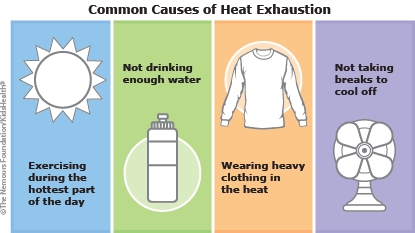Heat exhaustion happens when someone loses a lot of liquids through sweating. With quick treatment that cools the body and replaces liquids and salt, most kids get better and don't have any lasting problems. Follow these instructions to help your child as they recover from heat cramps and to help prevent them and other heat-related problems.

As your child recovers from heat exhaustion:
- They should take it easy for a day or two.
- Ask your health care provider when your child can go back to sports and being outside in the heat.
- Make sure they drink plenty of liquids. They can drink water, but your health care provider also may recommend drinking liquids with salt in them (such as oral electrolyte solutions or sports drinks) or adding salt to their food.
- Have them take any supplements or vitamins as recommended by your health care provider.
- Help them avoid caffeine, which causes liquid to leave the body through pee.
- Offer a regular diet. If your health care provider recommends it, add more salt to your child's diet.
- If your child had muscle cramps and has sore muscles, you can try:
- gentle massage and stretching of the sore muscles
- having them take a warm bath
- applying a heating pad or ice wrapped in a towel on the sore muscles
- helping your child relax (for example, through deep breathing or meditation)
- medicines such as acetaminophen (Tylenol® or a store brand) or ibuprofen (Advil®, Motrin®, or a store brand) if your health care provider says it's OK. Follow the directions on the label for how much to give and how often.
To help prevent heat exhaustion and other heat illnesses:
Encourage your kids to:
- Drink plenty of liquids. Health care providers might recommend that kids who do endurance sports (such as football, running, tennis, or soccer) or exercise in hot weather drink liquids with salt in them (such as oral electrolyte solutions or sports drinks) or add salt to their food. Ask your health care provider about the right amount of salt for your child.
- Start slowly when exercising in hot weather. They should increase how long and hard they exercise gradually (over at least a week) so their body can adjust.
- Avoid exercising outside between noon and 6 p.m., the hottest part of the day.
- Take frequent breaks when exercising in the heat.
- Wear sunscreen. Sunburned skin can worsen heat illness.
- Dress in light clothing and only wear the minimum gear needed to stay safe when exercising in hot weather. For example, at football practice when working on endurance through running, they can take off their helmet and padding.
- Avoid exercising in the heat when sick or taking any new medicines, especially if they have a fever.
- Avoid caffeine.
- Take any supplements or vitamins as recommended by your health care provider.
Other safety tips:
- Talk to your health care provider and coaches before your child starts any exercise plan if they are overweight, have been diagnosed with sickle cell trait or another medical condition, or take any medicines.
- Talk to kids about the dangers of heat illness. Teach them that they should stop exercising and cool off right away if they feel extremely hot or thirsty, weak or tired, or have cramps or other symptoms.
- Be sure all your child's coaches and athletic trainers understand the dangers of heat illness and that they take safety precautions when the weather is very hot or humid (such as shortening or canceling practice or moving practice indoors).
- Don't ever leave kids alone in a parked car. Even on a mild, sunny day, temperatures inside a car can reach dangerous levels.

What if my child gets heat exhaustion again? You need to cool your child down and give them liquids as soon as possible:
- Take them to a cool place, with air conditioning if possible.
- Remove any extra clothing.
- Put ice packs or a wet, cool cloth on their skin, especially on the neck, groin, and armpits. You also can pour cool water onto their head and skin.
- Help them drink cool liquids, preferably a drink with salt in it (such as an oral electrolyte solution or sports drink). But if a drink with salt in it isn't available, give water.
- Call your health care provider.
What can happen if heat exhaustion is not treated? A child with heat exhaustion who doesn't get cooled down and drink liquids can develop heatstroke. Heatstroke is a medical emergency. If it's not treated, it can lead to organ damage and even death.



